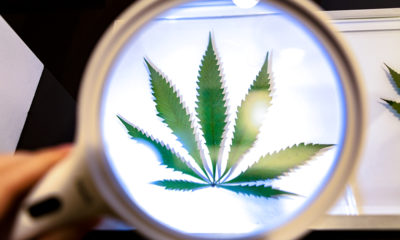
Medical
Patients: Utah’s Medical Marijuana ‘Compromise’ Proposal Is Terrible
Patient-advocacy groups slam governor-approved marijuana bill as an unworkable stunt
Earlier this month, Utah’s near-uniformly conservative elected representatives gathered with medical marijuana activists — the same activists behind what appeared to be a medical-cannabis legalization bill that appeared to be a near-lock for voter approval on Election Day — for what appeared to be a breakthrough kumbaya moment.
Instead of fighting Proposition 2, a citizen-led voter initiative that would have granted Utah a decent and workable medical-marijuana system, the Church of Jesus Christ of Latter Day Saints and the Utah Medical Association were willing to compromise and went as far as to give vocal support in principle to a compromise bill outlined in writing.
Though Prop. 2 will remain on the ballot, the smart money seemed to be on the compromise bill. Everyone important lined up behind it. Gov. Gary Herbert was on board — and unlike Prop. 2, which had very solid support from voters, according to polls, this had guarantees.
Unlike in other states, state lawmakers can unilaterally amend voter initiatives. With the compromise, there was no need to worry about the Legislature gutting a voter-approved medical-marijuana bill. Everyone would go home happy.
There’s just one problem: The compromise bill is bad, according to analysis released Wednesday by Americans for Safe Access, a prominent Washington, D.C.-based medical-cannabis patients advocacy group.
The compromise bill puts all distribution in the charge of a state-run pharmacy — a serious problem, considering that “pharmacies” have federal licenses to distribute other medicines, licenses that could be at risk if they also dispense cannabis.
It also outlaws patient access to dried cannabis flower.
In other states, prohibiting access to cannabis flower has proven to be a sometimes insurmountable barrier to practical access to marijuana. And there is no other state where cannabis is available only from state agencies.
The compromise bill does offer patients some employment protections, safeguards not included in Prop. 2. However, “the compromise legislation creates serious issues of accessibility and functionality for patients, particularly when considering the framework of a state central pharmacy,” said David Mangone, ASA’s director of government affairs, in a statement released Wednesday.
Other patient advocates were similarly critical, including Christine Stenquist, a brain-tumor survivor who has been a regular fixture at the state Capitol, agitating for legal medical cannabis access.
“My biggest concern is that this replacement bill was born in fear and designed to fail,” she said in a statement Thursday that blasted the compromise bill as a “stunt.”
“[U]nder this replacement legislation, Utah’s sick are treated as criminals until proven patients,” she added.
It’s not clear how amenable Herbert or other shot-callers in Utah will be to changes to the compromise bill.
In the meantime, Proposition 2 remains on the ballot.
TELL US, do you have medical marijuana in your state?
























